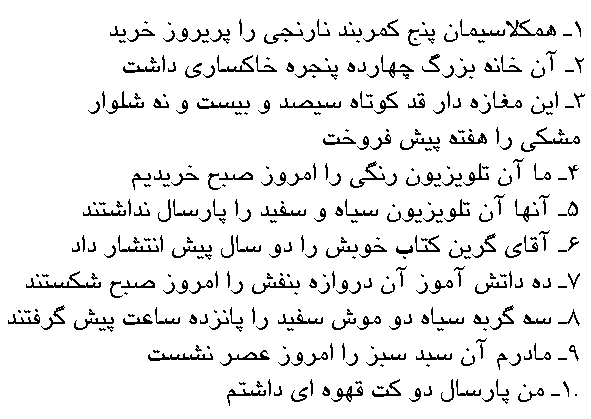As you know, practice makes perfect! These useful drills present even more new words for you to add to this week’s lesson. This will not only build your Persian vocabulary, but also help you learn to read and write Farsi more quickly and confidently.
Note: Before doing these homeworks, make sure you have learned the previous words fluently.
New words:
Kamar band Maghazehshop keeper = ![]() /mægha:zeh da:r/.
/mægha:zeh da:r/.
color TV = ![]() /televiziyu:n-e- rængi/.
/televiziyu:n-e- rængi/.
black and white TV = ![]() /televiziyu:n-e- siya:h-o- sefid/.
/televiziyu:n-e- siya:h-o- sefid/.
to publish = ![]() /entesha:r da:dæn/.
/entesha:r da:dæn/.
Please translate the following sentences into Persian.
You already know how to use the rule. You may find the answers below.
- Our classmate bought 5 orange belt the day before yesterday.
- That big house had 14 grey windows.
- This short shop keeper sold 329 black trousers last week.
- We bought that color TV this morning.
- They didn’t have that black and white TV last year.
- Mr. Green published his good book two years ago.
- Ten students broke that purple gate this morning.
- Three black cats caught two white mice 15 hours ago.
- My mother didn’t wash that green basket this evening.
- I had two brown coats last year.

ali
September 9, 2012 @ 11:58 am
thankkkkkkkks a lo
Lorentso
January 18, 2013 @ 5:26 pm
Salam lotfan kalameye (khakestary) ra dar jomleye dovom eslah konid. Motshakeram ,
Lorentso
January 18, 2013 @ 5:30 pm
There is also another mistake in the seventh line, there is written (dateshamoz) and there should be (daneshamoz) Thanks for the great job,,,
M-L
April 28, 2013 @ 8:54 am
Hi again! Sentense no two: Why is there no ra? How is grey spelled? I learned a similar Word.
codejamer1
July 3, 2013 @ 9:51 pm
Hi ,
In sentence number 10, why is there no ‘ra’ after kut (coat) please?
Thanks.
KFC
August 28, 2013 @ 3:41 pm
remember that if there is an adjective for the object, then the ra should come after that, not the noun. There is no ra though even after that in this sentence however. I think its just a mistake.
Michael
January 25, 2015 @ 7:25 am
ra isn’t always used with the verb –>
“Why the translation of the sentence ‘He had a basket’ has no ‘ra’ in Persian?
In simple words, why this equation is right? He had a basket = او یک سبد داشت
And why this one is not right? He had a basket = او یک سبد را داشت (with ‘ra’)
Think about it first. Then, to check your answer read below:
Because we do not know which BASKET it is talking about. We only know that ‘HE HAD A BASKET’. In this case, mostly we do not need ‘ra’. ‘ra’ is somehow works like ‘the’ in English.”
Saalim Younus Rahimi
December 9, 2014 @ 12:47 am
Thanks a lot.
doiog great job
Nasheema
January 26, 2016 @ 1:25 pm
I would like to profusely thank you for such an extensive website to learn this beautiful language.Your efforts are much appreciated.
Emre
June 30, 2016 @ 12:04 pm
i think first example verb it s wrong. you write “kherid” but why dont we use “kherim” with “ma”
Bart Haerens
September 15, 2016 @ 3:38 pm
It’s not we, it’s he: “our classmate” = “hamkelas”